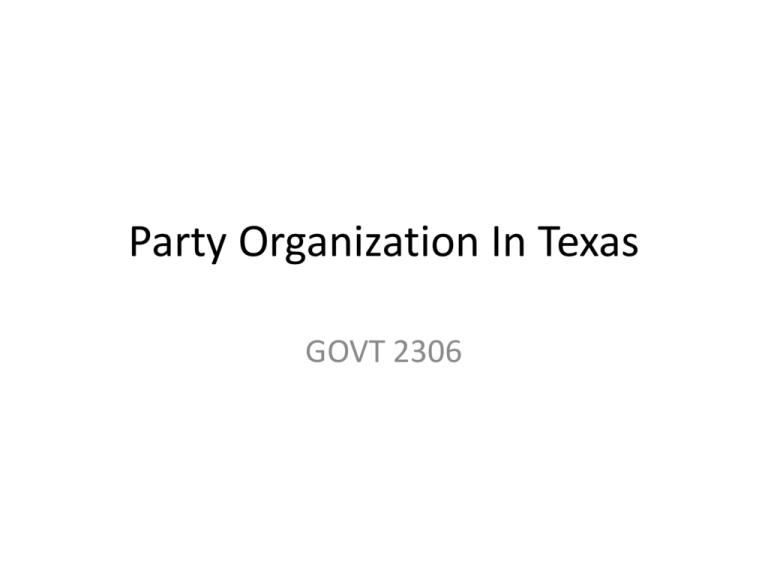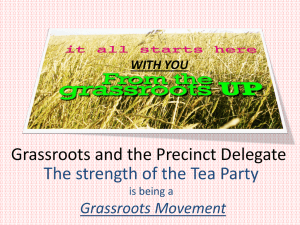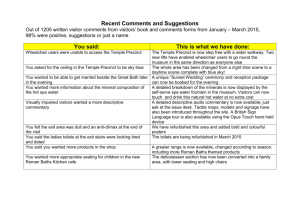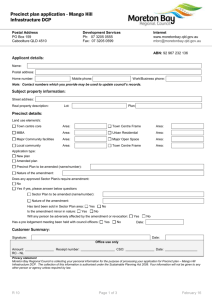Party Organization In Texas
advertisement

Party Organization In Texas GOVT 2306 In these slides I’ll try to walk through the structure of the major political parties in Texas. This will include a look at how Texas parties are connected to their national compatriots. A distinction will be drawn between the organization that organizes each party on an ongoing basis, and the organization that exists temporarily during the election season. It’ll conclude with a look at the current state of the organizations of the Democratic and Republic an Parties. There will be some information about how minor parties in the state are organized. The respective party websites will be resources for us as we proceed. You may want to familiarize yourself with them before you proceed: Texas Democratic Party Texas Republican Party I recommend this page which reviews the party structure of the Republican Party of Texas. Similar information about the Texas Democratic Party can be found in different places on its website – click “Our Party” and “Resources” in the drop down menu. The county party websites are worth looking at as well. Brazoria County Democratic Party Brazoria County Republican Party Harris County Democratic Party Harris County Republican Party Much of the material below is pulled from these sites. A quick reminder: Political parties in the US are decentralized, much like the entire governing system. They are organized at the national, state, county and precinct local levels. As a result they are very decentralized. Conflict is common between each level. In fact there is as much conflict within the two parties as there is between them. Here’s a fancy applicable word: Stratarchy: a political system where power is diffused among and within levels of party organization. Here is one of many definitions of “political party.” “A combination of people and interests whose primary purpose is to gain control of government by winning elections.” I found this language from the Republic Party of Texas’ “About the Party” page interesting: “The RPT is legally classified as a general purpose political committee whose structure is determined by Federal law, State law and by Party rules not in conflict with State law.” So, in a strictly legal sense a political party is actually a: general purpose political committee Now you know In order “to gain control of government by winning elections,” parties have evolved into distinct institutions in the state that are intertwined with the electoral and governing systems in the state. A handful of functions related to elections are delegated to political parties and are defined in state law. State elections code covers aspects of party organizations – this despite the fact that parties are not mentioned in the Texas Constitution. Click here to go to the State Election Code – look under Title 10 for laws related to parties. Each party is chocked full of lawyers who know this code back and forth, in addition to elected party members who can make strategic changes to these laws for advantage when appropriate. The election code establishes a very similar structure for each party. Again – walk through Title 10 of the Election Code (named Political Parties) to get an idea of how the state structures parties, party rules an defines the roles of parties in the electoral process. Now let’s look at how parties are organized – generally - in the state. Again – a reminder – more detail can be found in the webpages of the state and county parties. Note that the following refers to the Democratic and Republican Parties in the state. Smaller parties are organized differently – they operate without conventions. More on them later. For now you click here for the local Green Party, here for the state Libertarian Party, and the Harris County Libertarian Chapter here. Rules are different for these parties due to their small size. First point: Party organizations can be broken down into two broad types: Temporary Party Organization Permanent Party Organization Temporary Party Organization This refers to the short lived organizations that exist following primary elections and are terminated at the conclusion of the national party convention. They are the precinct, county or district, state and national conventions that allow rank and file voters the opportunity to influence the state party’s decision-making process. The purpose of this organization to connect the preferences of precinct voters to the state and nation. The temporary party organization is a relatively recent development in Texas politics, well – if you consider developments since the early 20th century as being recent. It is the result of the introduction of the political primary election in Texas – a subject discussed elsewhere. The purpose of the primary was to limit the power of party machines, which were often organized around a powerful elected official, usually a county judge. The judge’s control over elections allowed for full control over the local, county government. Allowing primary voters to determine party candidates whittled away at that power. Permanent Party Organization This refers to the year round organization that lead and operate the precinct, county or district, state and national parties year around. They include precinct, county and state chairs and the executive committees on the county, state and national level. These are the people who ensure that the party remains competitive and that its interests are served. The former exists during elections – specifically between primary election day and the national convention. The latter exists continually and is held accountable by the temporary party organization. The two are inter connected. Members of the permanent party organization, for example, try to influence who participates in the temporary party organization. Tyr to keep this point in mind: political power within parties tends to be held by those who have a deep understanding of, and influence over, the rules that govern party organizations. To help clarify, here is a graph. The temporary party organization is on the left, the permanent party organization is on the right. Note that party authority rests on the primary voters. More accurately, those who choose to show up and vote in party primaries. This can be a very small percentage of the general population. Note: Primary voters are presented with ballots that are prepared by the county party. This means that their choices are constrained. The decision they are presented with is presented to them by the permanent party organization already in place. Note the inter relationship that exists between the temporary and permanent party organization. Question: How do people get on the county primary ballot? “In order to be listed on the primary ballot for one of the two major parties - Democratic or Republican - a candidate must either collect signatures on a nominating petition or pay a filing fee to the county or state chair of the appropriate party. The number of signatures needed and the cost of the registration fee vary according to the level of office being sought. This chapter's feature entitled Getting on the Primary Ballot lists the various requirements for major party candidates.” – From Texas Politics, Chapter 2.1. Keep this in mind: both the temporary and permanent party organizations are based on the decisions made by the primary voters of each party in each precinct. Remember that primary elections are held every two years in the state according to rules passed by the legislature that can be found in the state election code. They are party elections and allow party members to vote for party leaders and for their party’s candidates for the general election. Generally primaries in Texas are held in March of even numbered years. A quick point about precincts – which were covered in the section on elections in the state. The precinct is the smallest political unit in the state. It has no governing authority. It exists to help organize elections. Each county commissioners court is responsible for carving each county into a number of precincts where each election is actually carried out. Harris County has about 1,000; Brazoria County has about 60. The county appoints election judges to run each election. Judges are nominated by each party’s county chair. Whichever party’s gubernatorial candidate won the majority vote in the precinct in the previous election gets to run the election, but the party whose candidate came in second gets to appoint an alternate judge that assists and oversees the election judge. So each party has an official that gets to oversee the elections in each precinct. There are over 8,500 precincts in the state of Texas. The number varies since the design of precincts can be malleable. This fact, by the way, has led to the accusation that the precincts are redrawn in order to suppress voter turnout. The drawing of election precincts is covered in Title 4, Chapter 42 of the Texas Election Code. Section 42.001 establishes that this is the responsibility of the county commissioners court. Click here for Brazoria County Precinct Maps, and here for Harris County Precinct Maps. When you register to vote, in addition to telling the county that you are qualified to vote you are telling them where you live, which tells them what precinct you live in. This determines where you can vote. If you show up to vote, your name only appears on a list in the designated polling place. If you show up to vote in a particular party’s primary election, you are effectively declaring yourself to be a member of that party for that electoral cycle. This is true whether you are in fact a true identifier with that party. This means that you can help make fundamental decisions for the party. Stories exist about members of one party voting in bulk in the other party’s primary in order to disrupt their organization. There is little real evidence of this, or that these efforts are effective. This is a key point: The process for establishing both the temporary and permanent party organization begins with the primary voter. We cover primaries and what conditions apply for voting in primaries elsewhere. This connects each party to the rank and file at the lowest level of government. This can create opportunity for conflict between the rank and file and the party leadership. For example, the Tea Party used the position of precinct chair as a way to exert influence on the Republican Party. Primary voters do two things that impact the temporary and permanent party organization: First, they vote for their precinct and county chairs; Second, they have the option to attend the precinct convention that is held immediately following the end of the election at the site of the election. Key point: By voting in the party primary one has earned the right to participate in the selection of party officials, party candidates and the content of the party’s platform. If you do not participate, you relinquish that right. Here’s more detail on the temporary party organization In essence, the temporary party organization is simply a series of party conventions that begins with one held just after the polls shut down after the party primary has been held. The first is the Precinct Convention This is a short meeting composed of interested and involved primary voters. Any person who votes in the party primary can participate in the precinct convention. These begin soon after the polls close and the votes are counted. If one can prove they voted in that election, they can stick around to participate. Click here for info from the Wise County Republican Party. The precinct convention is presided over by the precinct chair – which is part of the permanent party organization discussed below. Precinct chairs are responsible for organizing the party at the precinct level. Two basic things happen in the precinct convention. First, resolutions are introduced, debated, voted on and adopted that can then be sent to the county or senatorial district convention for further consideration. These resolutions allow for rank and file input over what the party stands for, what issues they want the party to prioritize. Second, delegates are selected to go on to the county or senatorial district convention. In presidential years participants must state their preferred presidential candidate. Delegates to the county or senatorial district conventions are selected based on the support that each candidate received in the precinct vote. The delegates from the precinct are to be a reflection of the relative strength of each political faction in the precinct. Conflict can result from this however and some groups can walk out of the precinct and present themselves on the next level as the real delegates from the precinct. Credentials committees are used to determine which delegates from the precinct are legitimate. Important point: Participation in precinct conventions is usually very low. 2% turnout among primary voters is not unusual. This allows a small determined minority of the voters to dominate the conventions. If they can do so in a number of precincts, these groups can develop tremendous influence in the party beyond their numbers. Internal partisan political conflict – ideological or otherwise – often begins at this level of organization. Various factions can compete at the precinct level to define what the party stands for. Another important point: Power tends to be held by those who understand the rules that govern how precinct conventions work. The Precinct Project exists to encourage people to become more involved at the precinct level. The Texas Precincts page contains information on how to get on the ballot to be a precinct chair and how the convention process works. A quick word on clubs and organizations would be worthwhile here. Party organizations are augmented by a variety of clubs which help party identifiers participate in party affairs and socialize with those with similar views. Click here for a broad description from the Texas Democrats here and Republicans here. These can be very influential. The Tea Party began a local organizations prior to receiving support from national groups. There are many area clubs and organizations that provide similar opportunities in Brazoria and Harris Counties. You can finds links to area clubs on the county party websites: Brazoria County Democratic Party Brazoria County Republican Party Harris County Democratic Party Harris County Republican Party Clubs can be places where interested citizens can learn the political process including the rules governing party activities. They also can influence elections by providing endorsements for elected officials – especially in the primary process when candidates are competing against other party members. For an example, click here for the endorsements page of a 14th Court of Appeals candidate. Next step: The County or Senatorial District Convention Soon after precinct conventions, county or senatorial district conventions are held. By law, these are normally held on the second Saturday following the precinct convention. The Texas Republican Party website has instructional videos on how to run county conventions. Click here to access it. A quick clarifying point: Notice that some conventions are county wide, while some are held at the senatorial district. This refers to an interesting conflict in the organization of parties in the state. Some organization is based on counties, some is based on Texas senatorial districts – these are the 31 districts that Texas’ state senators are elected from. County conventions are held in all but the largest counties in the state – this includes Harris, Bexar, Dallas and Tarrant. The reason is that these are very large counties that contain more than one senatorial districts within them. In counties with smaller population – those that are included among others within a senatorial district – the convention is held at the county level. Notice that in each situation, the convention is held in the smallest political unit. Here’s the map of area state senate districts. Notice that Harris County has several within it, but the surrounding counties have only one. Brazoria County has two, but it holds a county convention regardless. County conventions are presided over by the county chair. Senatorial Conventions are presided over by the chair of the Senate district. Often this person is closely affiliated with the Senator that represents that district. Historical note: County conventions were once dominated by the county judge and his supporters – or “machine” if you prefer. These officials were sometimes referred to as party bosses. The primary was instituted in part to limit their control over the county party apparatus. Control over the county conventions lent itself to control of much of the political process. The same things that happen at the precinct convention happens at this level as well. Resolutions from the precincts are considered, and are adopted or rejected. Those adopted are sent up to the state convention. Delegates are selected to go to the state convention. The same political disputes that occurred at the precinct level can also occur here. Walkouts can also happen which lead to conflicts over which resolutions and delegates should be accepted at the state convention. Again a credentials committee determines who has the legitimate right to participate at the state level. Specific decisions on these matters are made in a variety of committees: Credentials Rules Party Organization Resolutions Nominating Then: The State Convention The major parties in the state hold their conventions – generally – in June of each even numbered year. Here’s a rundown of what happens at the state convention: 1 - They elect the state party officers. This means that members of the temporary party organization hire the members of the permanent party organization. 2 - They elect the members of the State Executive Committee, which is part of the permanent party organization and is composed of two members from each of the 31 senatorial districts in the state. Again, the temporary organization selects the permanent organization. 3 – They adopt the party platform These are based somewhat on the platforms that the party had previously adopted, but subject to change due to the resolutions introduced across the state in the precinct conventions held a couple months previously. The “planks” of the state party platforms are then proposed for the national party platform when they meet during presidential election years. For recent party platforms: 2012 TDP Platform - Texas Democratic Party 2012 REPUBLICAN PARTY OF TEXAS - Texas Freedom Network Note: The party platform is a product of the influence of the rank and file participants in the party. It is not binding upon the party’s candidate’s – though since they reflect the wishes of the party activists, candidate’s run great risks if they ignore the platform. 4 – Certify to the Texas Secretary of State’s office of the candidates selected in the March primary. This means that they qualify to be the party’s nominees and are to appear on the general ballot. This is evidence that the state’s election apparatus is tied into the parties in the state. In presidential election years, the state conventions performs three additional functions. Each of those years, the primary is more properly referred to as the “presidential preference primary.” 1 – They elect the party nominees from Texas to the national executive committee. The state’s influence over the national party is based on how much representation the party has in the national executive committee. 2 – They nominate members to serve as Texas’ presidential electors should their party’s presidential candidate win the majority vote in the state. Remember that each state has the ability to determine for itself how to select presidential electors. Texas has 38 electors, in case you were wondering, because it has 36 members of the House and 2 Senators. 3 – They select some of the delegates pledged to presidential candidates to the national convention. The presidential preference primary is different that the primary elections for other positions. It is a system based – more or less – on proportional representation. The preferences for different candidates among party identifiers for different presidential candidates determines how many delegates are apportioned to each candidate. A quick point: As with the national convention, the discretionary role of the state convention in the electoral process has been limited by the primary electoral process. Party leaders have less discretion in determining who delegates will support for the presidency, and who will be able to participate in the convention now than when the state was run by party bosses. The Texas Democratic and Republican Parties do this differently. The Texas Republican Party selects all of its delegates based on the basis of primary votes. The Texas Democratic Party select just over half of its delegates based on primary votes. A few more are based on the results of the precinct, county and district conventions, and the remainder are “super delegates” that chosen by elected and national party officials. So the Republican Party process is more strictly a primary system. The Democratic Party process is more a hybrid of a primary and caucus system. Its called the Texas Two Step Click here for how it works according to the Houston Chronicle. And a link to Change the Caucus, which hopes to change how Democrats allocate delegates. Here’s an explanation of the 2008 process from U.S. News and World Report “Today, they give us "the Texas Two-Step," a fun electoral dance in Texas in which voters can participate in both a primary and a caucus. Delegates are awarded with a typically overly complicated Democratic twist. Texans who decide to vote in the Democratic primary can do so without being a registered Democrat. They are able to vote during an early voting period, which occurred February 19-29, or they can vote today. The candidate who "wins" the Democratic Texas primary will get a big chunk of the 126 delegates up for grabs. But there are still an additional 67 delegates to be distributed to the candidates through a multilayered caucus process. Those who have voted in the Texas Democratic primary are eligible to take part in a caucus at their precinct location this evening. Those caucuses will choose delegates who will go on to a county/district Democratic convention to be held on March 29. But it's not over after that. Delegates at the county/district convention will choose delegates to go on to a June 6 state convention in Austin. Those delegates will choose how the 67 national delegates are split between the candidates.” After the conventions are over, the temporary party organization is dissipated. Now let’s shift to the permanent party organization Here’s the graph again. Note the part on the right hand column. As mentioned above, this organization is composed of the officials who hold official positions within the party between elections. They are selected by the temporary party organization to run the party. We’ll start with the lowest level of organization. Here is the relevant part highlighted again. As with the temporary party organization, the permanent party organization is broken down into precinct, county (no senatorial districts), and state levels, in addition to the national level. And also – the basis of the permanent party organization is the primary election voter. The primary voter – in addition to the candidates for elected office elects both chair for their precinct, and the county chair. Again, the party structure rests on the primary voter. Let’s walk through the different positions. What is a precinct chair? This office is at the bottom – or grassroots level of the party structure. It is closest to the voter. The person is elected to a two year term. The race is often uncontested – sometimes the position is unfilled. The stronger the party, the more active the precinct chairs. The goal of the precinct chair is to organize party members in the precinct and staying in touch with known party members in the precinct. This is easy to do by seeing who has voted in the party primary elections. They are responsible for voter registration drives, get out the vote efforts and are members of the county’s executive committee. Parties often have to recruit people to serve as precinct chairs. Sometimes this is difficult to do. Not all precincts have chairs. The strength of a party in an area of the state can be determined by how many precincts have competent chairs organizing party activity. Here’s a link to the list of Democratic precinct chairs in Brazoria County. And here’s a link to the Republican precincts chairs in the county – which includes all the rest of the executive leadership General comment. Becoming a precinct chair is a great way to become involved in the political process. Ron Paul calls the precinct chair the most powerful office in America. The best way to become precinct chair is through the county party of your preference. The only hitch is that precinct chairs sometimes hold their offices for long periods of time. Ineffective chairs can be very damaging to a political party however. From the Texas Democratic Party: Become a County of Precinct Chair. Here’s similar info from the Harris County Republican Party. The next step up is the county chairs. What is a county chair? The county chair is also elected to two year terms in the party primary. This is a much more active position. The county chair presides over the county executive committee, which is composed of all of the precinct chairs in the county. It is the county chair’s responsibility to ensure that the party is competitive. The county chair works with the county commissioners court to organize primary elections. They appoint all of the primary election judges, and determine voting locations. They oversee the acceptance of candidates who have applied to run for office under the party label and they oversee the placement of names on the ballot. They also are responsible for printing the ballot, renting voting machines and hiring poll workers. Note: County chairs have to be on the lookout for candidates who might not be party supporters. Sometimes one party tries to undermine the others by planting fake candidates in its races. Hey this is Texas. Removing someone from the ballot can be very difficult though. County chairs must certify to the Texas Secretary of State’s office, after each primary election, the names of the official nominees of the party for the general election. Here are the area county chairs: Brazoria County Republican Chair: Yvonne Dewey Brazoria County Democratic Chair: Sue Funkhouser Harris County Republican Chair: Jared Woodfill Harris County Democratic Chair: Lane Lewis Together the precinct chairs and the county chairs comprise the County Executive Committee (CEC). The County Chairs presides over the meetings. The CEC oversees party business, receives filing fees and petitions from primary candidates for county wide office. They place names on the ballot and arrange for the county and district conventions. Here’s a link to the agenda of a meeting of the Brazoria County Executive Committee dated June 20, 2013. And a link to a page describing resolutions passed in May 2013 by the Harris County Republican Party’s Executive Committee. The State Chair and Vice Chair The State Executive Committee The highest level of party organization in Texas is the state executive committee (SEC). These are composed of a party chair and vice chair as well as two committee persons from each of the senatorial districts in the state. One male, one female. All are elected by the delegates to the state conventions. The chair of the Texas Democratic Party is Gilberto Hinojosa, the vice chair is Tarsha Hardy. The chair of the Texas Republican Party is Steve Munisteri, the vice chair is Melinda Fredricks. Each party has an State Executive Committee. Click here for the SDEC, and here for the SREC. All these officials are elected in the state party convention. The purpose of the committees is to certify statewide primary candidates, organize the party conventions, promote the party and raise money for the party.






